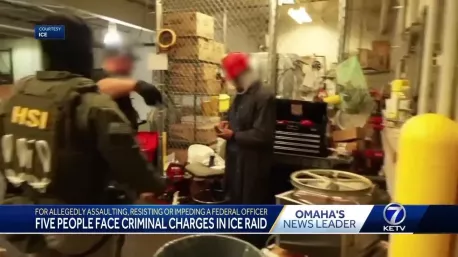Results: Meat Supplier Shuts Down Plant After Mass ICE Arrests
Published on 06/30/2025
Imagine going to the store to buy steak for a summer barbecue, only to be met with empty shelves and all-time high prices for the products on your shopping list. That's not a future scenario but an instant reality following yet another major American meat distributor, Glenn Valley Foods, reducing production to a mere 30% after a mass-scale ICE raid in Omaha, Nebraska. "Another Meat Supplier Shuts Down Plant After Mass ICE Arrests" by Priscilla Nyathi from Style on Main is the source for this survey.

QUESTIONS
GO to COMMENTS
Comments
1.
1.
Federal agents rounded up 74 to 76 workers, well over half of the plant's staff, on a single day at Glenn Valley Foods. The effects were quick: production fell to as low as 20–30% capacity, putting grocery chains and restaurant supply at risk. It is not an anomaly. With more than half of America's meatpacking workers foreign-born and many of them illegal, you cannot overlook the sector's exposed nature. Remove that workforce, and the entire industry shuts down, threatening jobs and national food security. Do these ICE raids seem like that they are just targeting violent criminals?

Yes
16%
340 votes
No
44%
914 votes
Undecided
18%
369 votes
Not Applicable
23%
477 votes
2.
2.
American beef already rings a record price because of a shrinking herd and drought-bred feed. Add labor shortages from ICE raids, and prices increase, hurting consumers the most. When factories cannot produce, the shelves are empty, restaurants panic, and low-income families are hurt the worst. Immigration enforcement, designed as a deterrent, is essentially a straight-up tax on the American dinner plate. Does the US need immigration reform that realistically addresses the needs of the American economy?

Yes
43%
894 votes
No
14%
289 votes
Undecided
18%
372 votes
Not Applicable
26%
545 votes
3.
3.
Glenn Valley Foods used E-Verify, the government's system for verifying work authorization. Still, ICE kept over half of its workers in custody, as agents bluntly told the company's president, "The system is broken." It discloses a national crisis: employers face a conflict between compliance and survival, and faulty verification tools put both employers and employees at risk. The result is an environment of fear and uncertainty that chases away investment and innovation. Should Congress fix the E-Verify systems as part of its much-needed immigration reform legislation?

Yes
47%
979 votes
No
8%
164 votes
Undecided
18%
383 votes
Not Applicable
27%
574 votes
4.
4.
When a meat plant shuts down, the ripple effect radiates far from its doors. Economies in the region, as well as rural America's already fragile economies, lose millions in wages, taxes, and retail and supply chain businesses. Schools, hospitals, and the housing market suffer as families are displaced or leave in fear. Trauma of raids, which often hit whole communities, lingers across generations. The impact isn't just economic, it's psychological and social. Is the Trump administration currently doing enough to address immigration issues that are fair and humane to all stakeholders?

Yes
18%
383 votes
No
38%
803 votes
Undecided
17%
352 votes
Not Applicable
27%
562 votes
5.
5.
If ICE ramps up enforcement, as proposed policy changes suggest, some 50% or more of farm and food processing workers in the country would be undocumented, leading to immense labor shortages in agriculture, hospitality, and construction. Prices and food insecurity would increase, and US competitiveness would decrease as businesses relocate or mechanize, if they still exist. This "law and order" approach would weaken the industries it seeks to protect. When the existing policy approach clearly does not work, is it time to change that failed policy?

Yes
45%
941 votes
No
9%
191 votes
Undecided
16%
341 votes
Not Applicable
30%
627 votes
COMMENTS


